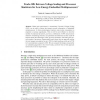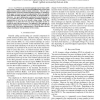245 search results - page 5 / 49 » A low power scheduler using game theory |
126
click to vote
SAMOS
2007
Springer
15 years 8 months ago
2007
Springer
When peak performance is unnecessary, Dynamic Voltage Scaling (DVS) can be used to reduce the dynamic power consumption of embedded multiprocessors. In future technologies, however...
108
click to vote
ASPDAC
2001
ACM
15 years 5 months ago
2001
ACM
Low Power is an extremely important issue for future mobile radio systems. Channel decoders are essential building blocks of base-band signal processing units in mobile terminal ar...
121
click to vote
SAGT
2009
Springer
15 years 8 months ago
2009
Springer
In a scheduling game, each player owns a job and chooses a machine to execute it. While the social cost is the maximal load over all machines (makespan), the cost (disutility) of ...
154
click to vote
CORR
2010
Springer
14 years 10 months ago
2010
Springer
Power management is one of the vital issue in wireless sensor networks, where the lifetime of the network relies on battery powered nodes. Transmitting at high power reduces the l...
148
click to vote
ALGOSENSORS
2004
Springer
15 years 7 months ago
2004
Springer
WiseMAC is a medium access control protocol designed for wireless sensor networks. This protocol is based on non-persistent CSMA and uses the preamble sampling technique to minimiz...



